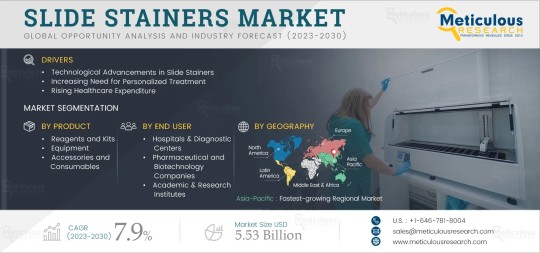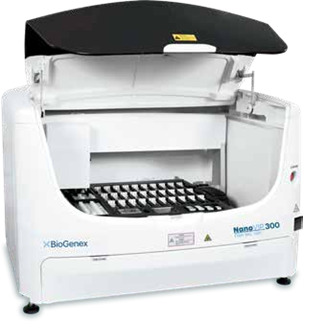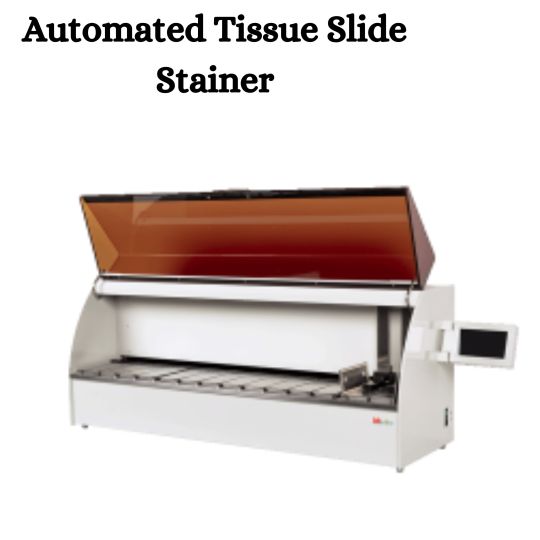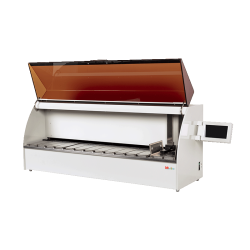#Automated Slide Stainers
Explore tagged Tumblr posts
Text
Slide Stainers Market Projected to Reach $5.53 Billion by 2030

Meticulous Research®—a leading global market research company, published a research report titled, ‘Slide Stainers Market by Product (Reagent [Stains, Mounting, Tissue Fixation, Processing] Equipment), Technique (H&E, ISH, IHC, Hematology, Cytology), Application (Diagnosis, Research), End User (Hospital, Pharmaceutical, Academic) - Global Forecast to 2030.’
According to the latest publication from Meticulous Research®, the slide stainers market is projected to reach $5.53 billion by 2030, growing at a CAGR of 7.9% during the forecast period. This market growth is driven by factors such as the increasing geriatric population, the rising prevalence of chronic diseases, advancements in slide stainer technology, the growing need for personalized treatments, higher healthcare expenditures, the demand for automation in diagnostics and clinical research, and the increasing focus on cancer drug research. Emerging economies and the rising demand for automated slide staining and diagnostic systems also present significant growth opportunities. However, the high cost of slide stainer systems and concerns about automated slide stainers, along with a lack of skilled professionals, pose challenges to market growth.
Key Players
The key players in the slide stainers market include Thermo Fisher Scientific (U.S.), F. Hoffmann-La Roche AG (Switzerland), Danaher Corporation (U.S.), Merck KGaA (Germany), Agilent Technologies, Inc. (U.S.), Becton, Dickinson and Company (U.S.), Abcam plc. (U.K.), Siemens Healthineers (Germany), General Data Company, Inc. (U.S.), Biocare Medical, LLC. (U.S.), BioGenex (U.S.), PHC Holdings Corporation (Japan), and Hardy Diagnostics (U.S.).
Market Segmentation
The slide stainers market is segmented by:
Product:
Reagents and Kits (including Grossing/Tissue Marking Dyes, Tissue Fixation Reagents, Tissue Processing Reagents, Mounting/Embedding Reagents, Stains [Hematoxylin and Eosin (H&E) Stains, Cytology Stains, Special Stains, Stain Controls, and Other Reagents & Kits])
Equipment (Automated Slide Stainers and Manual Slide Stainers)
Accessories and Consumables
Technique:
Hematoxylin and Eosin (H&E)
In-situ Hybridization (ISH)
Immunohistochemistry (IHC)
Hematology
Cytology
Microbiology
Application:
Disease Diagnosis (Infectious Diseases, Cancer, and Other Diseases)
Medical Research
End User:
Hospitals & Diagnostic Centers
Pharmaceutical & Biotechnology Companies
Academic & Research Institutes
Contract Research Organizations (CROs)
Geography:
North America (U.S. and Canada)
Europe (Germany, France, U.K., Italy, Spain, and Rest of Europe)
Asia-Pacific (China, Japan, India, and Rest of Asia-Pacific)
Latin America
Middle East & Africa
In 2023, North America is expected to hold the largest share of the slide stainers market, followed by Europe and Asia-Pacific. The U.S. is projected to be the largest market in North America, driven by its well-developed healthcare infrastructure and the presence of major market players.
Segment Highlights
Product: The reagents & kits segment is expected to dominate the market in 2023 due to the growth in clinical research and development activities and the increasing adoption of laboratory automation solutions.
Technique: The hematoxylin and eosin (H&E) segment is anticipated to hold the largest market share in 2023, favored by its extensive use in examining tissue and cellular structures in research and diagnosis of various diseases.
End User: Hospitals & diagnostic centers are expected to be the largest end-user segment in 2023, driven by the growing patient influx and the need for automated solutions to improve diagnostic efficiency and accuracy.
Geographic Analysis
The report provides an in-depth analysis of major regions including North America, Europe, Asia-Pacific, Latin America, and the Middle East & Africa. North America is expected to lead the market in 2023, supported by advanced healthcare infrastructure and significant investments in research and development.
Download Sample Report Here @ https://www.meticulousresearch.com/download-sample-report/cp_id=5643
Key Questions Addressed in the Report:
Which market segments are expected to experience the highest growth?
What was the historical market size globally?
What are the market forecasts from 2023 to 2030?
What are the key drivers, restraints, opportunities, and challenges?
Who are the major players in the market?
What is the competitive landscape like?
What recent developments have occurred in the market?
What strategies are the leading players adopting?
Which regions/countries are exhibiting high growth?
This comprehensive report provides detailed insights into the slide stainers market, helping stakeholders make informed decisions and capitalize on emerging opportunities.
Contact Us: Meticulous Research® Email- [email protected] Contact Sales- +1-646-781-8004 Connect with us on LinkedIn- https://www.linkedin.com/company/meticulous-research
#Automated Slide Stainers#Linear Slide Stainers#Multi-Slides Stainers#Tissue Slide Staining#Slide Staining#Stain Slides#Special Slide Stains
0 notes
Text
NanoVIP® 300 – All-in-One Fully Automated System for FISH, ISH, IHC

NanoVIP® 300 are diverse, fully automated barcoded systems for fluorescence in situ hybridization (FISH), in situ hybridization (ISH), miRNA ISH, and IHC. Its reliable automation combined with eXACT™ temperature modules, predefined protocols, and liquid level sensors for accurate liquid handling ensures robust and reproducible results.
#science#ihc#automated staining machine#automated immunohistochemistry#automated slide stainer#ISH#FISH#automated tissue stainer#slide staining machine
0 notes
Text
Automated Tissue Slide Stainer LMATS-A100
Labmate Automated Tissue Slide Stainer streamlines histology and pathology with advanced automation, replacing manual methods to reduce errors and boost efficiency. Ergonomically designed for low noise and smooth operation, it accommodates 18 cups 750ml each with processing times from 0 to 59 minutes.

#automatic slide staining machine#automatic slide stainer cost#automated tissue slide stainer supplier
0 notes
Text

Tissue slide stainer
Tissue slide stainer is a microprocessor-controlled unit with multiple slide staining protocol system. It has specimen slide capacity of 24 slides allowing for efficient and automated processing of multiple samples in a single run. Automated staining process provides consistent and reproducible results. Wash station is integrated into the stainer to remove excess stain and prepare the slides for the next staining step. Heating tank to control the temperature of staining reagents.
0 notes
Text
Automated Tissue Slide Stainer

Automated Tissue Slide Stainer LMATS-A100 is a fully automated and technologically advanced tissue stainer designed to automate the staining process for histological and pathological tissue samples. It replaces manual staining methods, reduces errors, and increases efficiency. It accommodates 18 cups, and each has 750ml of cup capacity and takes just 0 to 59 minutes of processing time.
0 notes
Text
Automated Tissue Slide Stainer
An automated tissue slide stainer is a sophisticated laboratory instrument used in histology and pathology to process tissue samples for microscopic examination

0 notes
Text
0 notes
Text
0 notes
Text
Elevate Lab Performance with the Advanced Automated Glass Stainer – Kirloskar Medical

In fast-paced laboratory settings, every slide matters. That’s why Kirloskar Medical offers the Automated Glass Stainer, a smart solution built for precision, reliability, and unmatched staining quality.
The Tissue-Tek Prisma Plus automates your slide staining process, delivering consistent, high-quality results—every time. Designed for high-volume environments, this stainer helps labs maintain accuracy while increasing throughput and reducing manual workload.
What sets it apart?
✅ Rapid, reliable staining for various protocols ✅ Minimal hands-on time with intuitive programming ✅ Consistent results for accurate diagnoses ✅ Supports lab scalability and efficiency ✅ Built to meet global quality standards
From research facilities to diagnostic labs, the Automated Glass stainer ensures your staining process is always a step ahead.
📞 Discover how it can transform your workflow: 👉 https://kirloskarmedical.com/product/tissue-tek-prisma-plus-automated-slide-stainer/
0 notes
Text
#Slide Stainer Market#Slide Stainer Market Share#Slide Stainer Market Trends#Slide Stainer Market Growth
0 notes
Text
Advancing Slide Staining Technology: Market Growth, Trends, and Key Insights
Market Overview
Slide stainers automate the staining of histology or cytology tissue specimens by diffusing dyes into samples using techniques such as indirect staining, surface adsorption, direct staining, and mordant staining. These automated systems are essential in hematology, cytopathology, and histopathology, as they aid in identifying cells or tissues for microscopic analysis and disease diagnosis.
In microscopic studies, staining highlights biological tissues like muscle fibers, connective tissue, and organelles. It helps in detecting specific compounds in samples, making it an integral part of processes such as gel electrophoresis and flow cytometry. Automated Slide Stainers simplify hematologic smear staining, adjust sample color intensity, and perform multiple staining operations simultaneously, improving efficiency in clinical and research laboratories.
Get Sample Copy @ https://www.meticulousresearch.com/download-sample-report/cp_id=5643
Market Growth Drivers
The demand for slide stainers is increasing due to several factors, including the aging global population, the rising burden of chronic diseases, advancements in slide-staining technology, and the growing need for personalized medicine. Additionally, the increasing focus on automation in diagnostics and research, higher healthcare spending, and expanding cancer drug research further drive market growth. Emerging economies and rising adoption of automated diagnostic systems also present significant opportunities.
However, the high cost of slide stainer systems is a major restraint, and concerns regarding automation and a shortage of skilled professionals pose additional challenges to market expansion.
Impact of the Aging Population and Chronic Diseases
Slide stainers play a crucial role in pathology and histology, aiding in diagnosing and managing chronic diseases that require continuous monitoring. The global aging population is expanding due to improved healthcare, urbanization, and rising income levels, leading to increased survival rates.
According to the United Nations, the number of people aged 65 years or older was 727 million in 2020, representing 9.3% of the global population. By 2050, this figure is projected to reach 1.54 billion (16% of the total population), with one in four people in Europe and North America being 65 years or older. This demographic shift is largely due to declining fertility rates and increased life expectancy. In 2020, the World Health Organization (WHO) reported that, for the first time, the global elderly population exceeded children under five.
With the aging population, cases of age-related chronic diseases such as cardiovascular diseases, cancer, and respiratory conditions are rising. In 2021, the WHO estimated that 41 million deaths worldwide were caused by chronic diseases, accounting for 74% of all global deaths. Cardiovascular diseases led the toll with 17.9 million deaths annually, followed by chronic respiratory diseases (4.1 million) and cancers (9.3 million). According to GLOBOCAN, 19.3 million cancer cases were detected worldwide in 2020, and this figure is expected to rise to 24.6 million by 2032.
Chronic diseases necessitate accurate diagnostic methods, and slide staining is essential in preparing tissue samples for microscopic examination. Staining enhances contrast and cellular structure visibility, enabling the identification of disease markers. Automated slide stainers are increasingly used in laboratories due to their efficiency, speed, and ability to reduce human error while processing high sample volumes.
Growing Demand for Automated Slide Staining and Diagnostic Systems
The rising need for reliable and rapid diagnostics is fueling demand for automated slide staining and diagnostic systems. Personalized medicine, which requires highly specific diagnostic tests, is further driving the adoption of automated systems. These systems support complex staining protocols, making them particularly valuable in cancer diagnosis and treatment.
Automated slide staining devices streamline tissue sample analysis, significantly reducing the time and labor needed for staining procedures. Traditional manual staining methods require technicians to prepare each slide individually, increasing the risk of human error and inefficiencies. Automated systems address these issues by performing the staining process quickly and accurately.
Furthermore, automation enhances the accuracy and consistency of diagnostic results. By implementing standardized protocols and automated processes, these systems minimize variability in staining outcomes, ensuring reliable and reproducible results. The increasing adoption of automated slide staining systems is creating new growth opportunities in the market.
Get Full Report @ https://www.meticulousresearch.com/product/slide-stainers-market-5643
Key Market Segments
Product Analysis
Reagents & Kits: This segment is expected to hold the largest market share in 2025 due to the growing demand for specialized reagents such as special stains, cytology stains, and mounting reagents. The increasing prevalence of cancer and infectious diseases has also contributed to the demand for reagents and kits used in diagnostic tests. Innovations such as multiplex staining reagents, which detect multiple biomarkers on a single slide, are further driving growth.
Equipment: Automated slide stainers dominate this category as laboratories increasingly transition to automation for efficiency and accuracy.
Accessories & Consumables: This segment includes buffers, solvents, and other essential components required for slide staining procedures.
Technique Analysis
Hematoxylin & Eosin (H&E): Expected to hold the largest market share in 2025, this technique is widely used in pathology and histology for tissue structure visualization. The development of advanced H&E staining systems has enhanced efficiency and accessibility, increasing adoption among researchers and healthcare professionals.
Immunohistochemistry (IHC): This technique is used to identify specific proteins in tissues, aiding in cancer diagnostics and research.
In-situ Hybridization (ISH): A crucial technique in molecular pathology, ISH is used for detecting genetic abnormalities and infectious agents.
Cytology & Hematology Staining: These methods are essential for studying blood cells and diagnosing hematologic disorders.
Application Analysis
Disease Diagnosis: Slide staining plays a critical role in diagnosing infectious diseases, cancer, and autoimmune conditions by enhancing tissue sample visualization.
Medical Research: Used in clinical trials and drug development, slide staining enables researchers to analyze tissue samples at the cellular level.
End-User Analysis
Hospitals & Diagnostic Centers: This segment is expected to dominate the market in 2025 due to the widespread use of slide stainers in pathology labs for disease diagnosis and treatment planning.
Pharmaceutical & Biotechnology Companies: These entities use slide staining in drug discovery and clinical research.
Academic & Research Institutes: The growing focus on life sciences research is driving demand for slide-staining equipment in educational institutions.
Contract Research Organizations (CROs): CROs use automated slide stainers for preclinical and clinical studies.
Regional Market Insights
North America
North America holds a significant share of the global slide stainers market due to the presence of major industry players, high healthcare expenditure, and advancements in diagnostic technology. The U.S. leads in market adoption, driven by the strong presence of research institutions and pharmaceutical companies.
Europe
Europe is a key market for slide stainers, with countries like Germany, France, and the U.K. investing in advanced diagnostic solutions. The region benefits from well-established healthcare infrastructure and government support for medical research.
Asia-Pacific
The Asia-Pacific region is the fastest-growing market, driven by the rising prevalence of chronic diseases, increasing R&D investments, and expanding healthcare infrastructure. Countries such as China, India, Japan, and South Korea are experiencing rapid market growth due to the adoption of automation in laboratory diagnostics.
Latin America, Middle East & Africa
These regions are witnessing steady growth due to improving healthcare infrastructure and increasing awareness about automated diagnostic systems. Brazil, Mexico, and South Africa are among the key markets in these regions.
Key Market Players
Leading companies in the slide stainers market include:
Thermo Fisher Scientific (U.S.)
F. Hoffmann-La Roche AG (Switzerland)
Danaher Corporation (U.S.)
Merck KGaA (Germany)
Agilent Technologies, Inc. (U.S.)
Becton, Dickinson and Company (U.S.)
Siemens Healthineers (Germany)
Abcam plc (U.K.)
General Data Company, Inc. (U.S.)
Biocare Medical, LLC (U.S.)
BioGenex (U.S.)
PHC Holdings Corporation (Japan)
Hardy Diagnostics (U.S.)
These companies focus on product innovation, strategic collaborations, and expanding their market presence to strengthen their positions in the industry.
Get Sample Copy @ https://www.meticulousresearch.com/download-sample-report/cp_id=5643
0 notes
Text
#Slide Stainer Market#Slide Stainer Market Trend#Slide Stainer Market growth#Slide Stainer Market Report#Slide Stainer Market Share
0 notes
Text
0 notes
Text
0 notes
Text
Automated Gram Stainer AM-GSB10

Abimed Automated Gram Stainer accommodates 16 slides and supports TB and Gram staining. It includes a touch LCD for easy operation, uses one-liter reagent bottles, and five-liter distilled water bottles. Safety features include a battery backup and lid lock for secure, uninterrupted use.
0 notes
Text
Automated Tissue Slide Stainer LMATS-A100
Labmate Automated Tissue Slide Stainer features an LCD touch screen, 18-cup capacity with 750ml cups, and processes 52 slides at once. Adjustable drip time (0-30s), 0-59 min processing, with air purification, water regulation, and corrosion-resistant housing for safe, durable operation.

0 notes